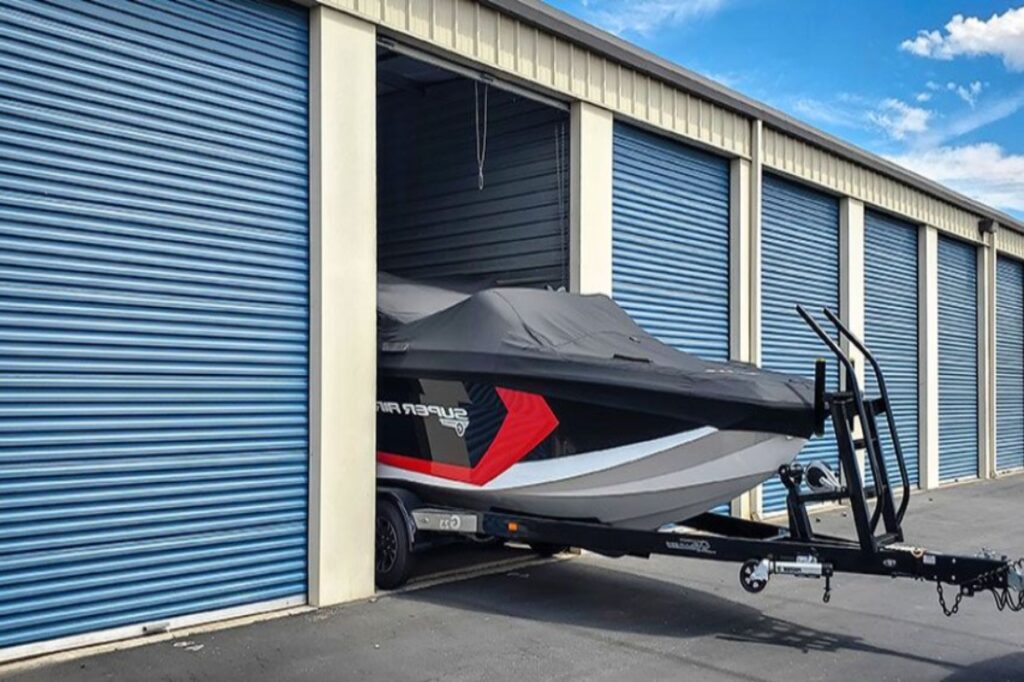As we move into fall and the weather starts to cool off, many boat owners are searching for indoor and outdoor boat storage solutions until spring.
Indoor Versus Outdoor Boat Storage
This search is not always the easiest one. Experienced boat owners know that they need to protect the boat against winter, but they also know that they must keep the boat action-ready for the next outing. It makes no difference if that outing is not until spring or next weekend. A savvy boater knows that the choice they make for storing the boat is an important one.
They are aware that the easier it is to get a boat out of storage. The more often they will be inclined to use it. That brings up the common question for boat owners…do I go with indoor or outdoor storage for winter? New boat owners may not know the different benefits of storing the boat indoors versus outdoors. To help you discover the difference between indoor versus outdoor for boat storage in winter, keep reading below!
Outdoor Boat Storage
The most economic option for outdoor boat storage is self-storage. That means that the owner can keep the boat on their property, or park it on a business property like a self-storage company, or marina until spring.
This option is not only economical, but the owner can keep tabs on it very easily. In fact, boats usually spend most time outside. Outside storage makes getting the boat into the water easier. And, if the boat requires maintenance or repairs, having it stored outside grants the boat owner easier access to it.
But, to store a boat outside in off-hours and down months means that it has to be properly shrink wrapped to survive the elements. Proper shrink-wrapping makes the boat resistant to water and moisture, and it allows the moist air to escape.
So, outdoor storage is a budget friendly option, that makes the boat more accessible to reach, but may make it vulnerable to the elements during inclement weather. However, if the owner lives in a warmer climate, that allows for winter boating, storing outside may be the best option because of the accessibility.
Cons of Outdoor Boat Storage
Before you decide against or for outdoor boat storage, let us discuss some cons that come along with storing a boat outside. First, as discussed above, outdoor storage puts a boat at risk for damage due to the elements and inclement weather.
This includes exposure from rain, sun, high winds, and snow. And, the boat owner will have to devote more time to upkeep the boat during cold weather. If the owner lives in a climate with snow, they will have to remove the snow from the boat regularly or it can build up and do some real damage to the boat. Also, the owner should monitor the boat on a regular basis, to make sure that no water has gotten its way to the interior of the boat. If the boat has water inside, the owner must then check for any ice formations that may have formed. These formations have to be broken up or they could damage the hull.
The boat owner should also be checking for any family of critters that may have made their way into the interior of the boat and made it their home for winter. Finally, if a boat is stored outside that means there may be a risk of theft, even if you set up security cameras.
Indoor Boat Storage
If you live in a colder climate with snow or ice, inside storage may be the right option. Indoor boat storage gives a boat owner added protection against snow and ice. Indoor storage will cost more, but the price provides the owner peace of mind in winter, knowing that the boat is being kept away from the elements.
And, choosing indoor storage for a boat means that the security is solid. Typically, most self-storage businesses have only authorized employees inside, and locked units. So, not only is the boat locked inside and safe from the elements, but also safe from theft and vandalism. A commercial storage facility should be considered if the owner lives in a place without storage like a garage.
The commercial storage facility usually provides a yearly lease that gives the boat a home. Most storage facilities are located in convenient, high-traffic areas that make getting to the boat easy. If the owner has space in their garage or a pole barn, they could try to store the boat at home.
But, that will not leave much room for anything else to be stored, so it may be an inconvenient option, although more affordable. Basically, storing a boat inside for winter in a colder climate is the best choice for full-service protection.
Dry Stack Boat Storage
Dry-Stack storage is one more option to consider for storage inside. The boat is shelved and put away, therefore protecting it from the elements. A boat owner can use the dry-stack method at marinas. The boat is raised into a covered building onto a boat rack.
This makes the boat ready for east access when the owner needs it. This will require a wet-slip lease for the boat owner. Some dry-stack facilities are seasonal and focus on storage rather than quick access to the boat.
There are, of course, some cons involved with inside boat storage. The price for storing a boat inside is considerably more expensive than storing the boat outside. But, with the price comes added benefits, especially if the boat owner lives in a cold climate.
Learn how to winterize your boat.

